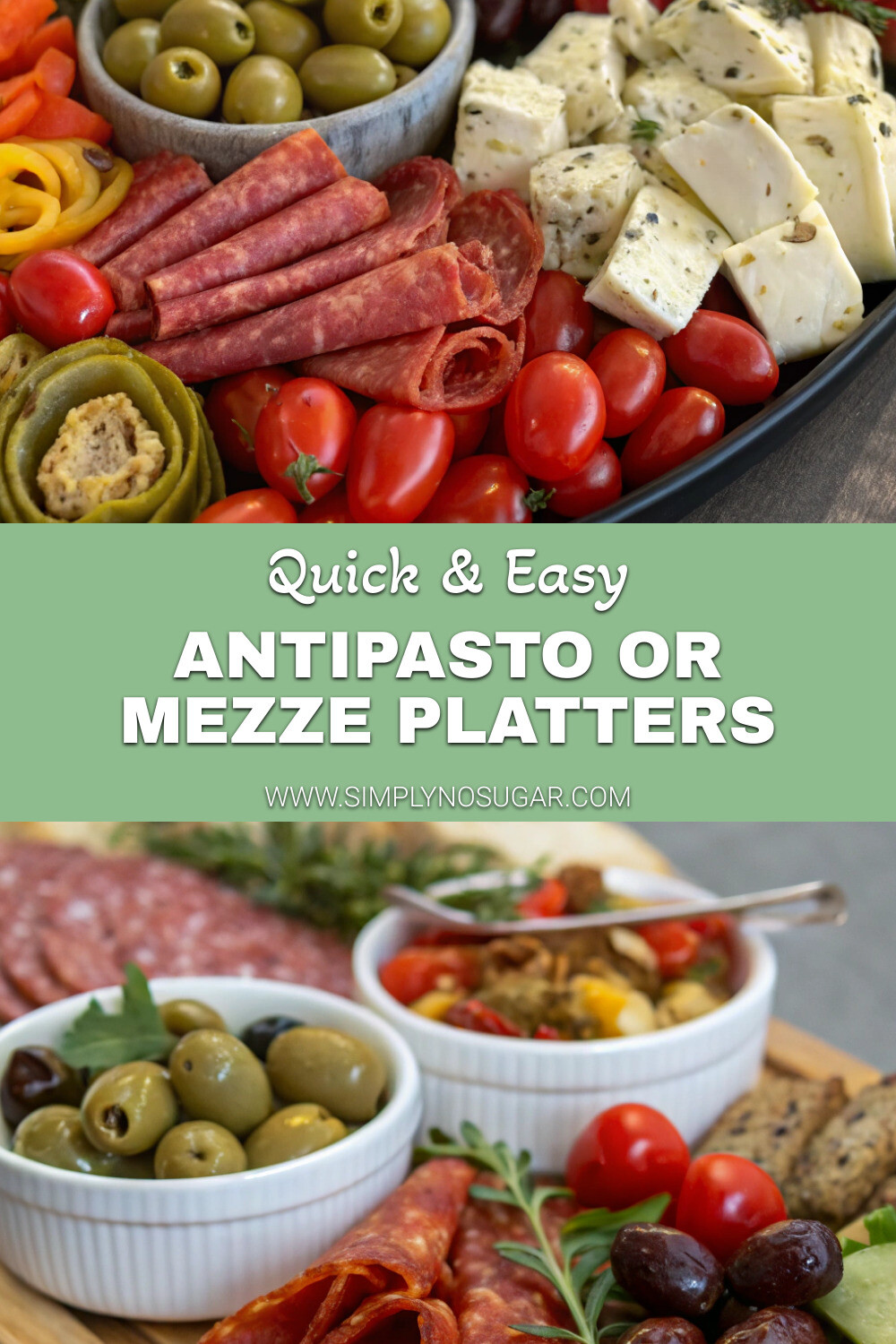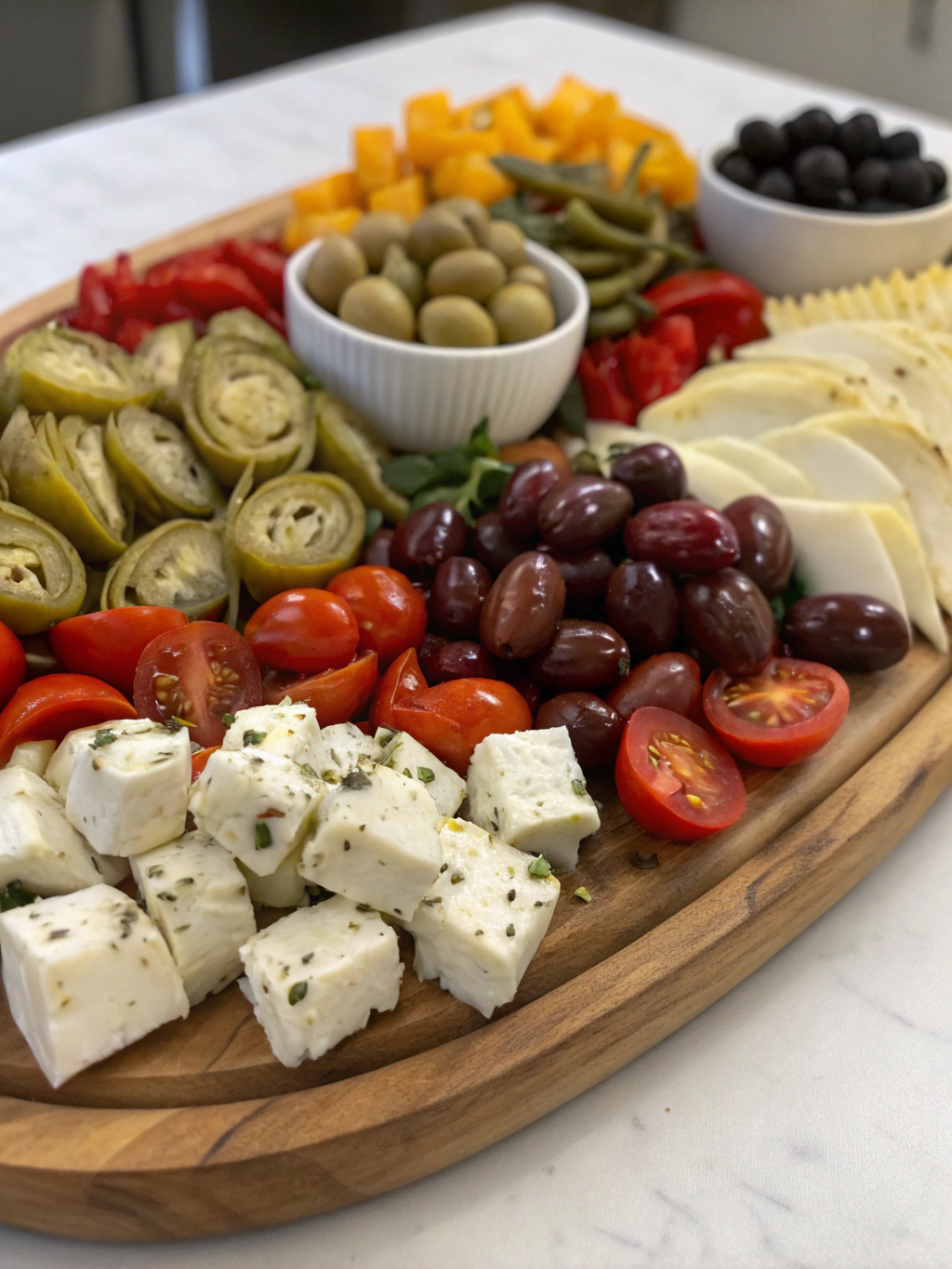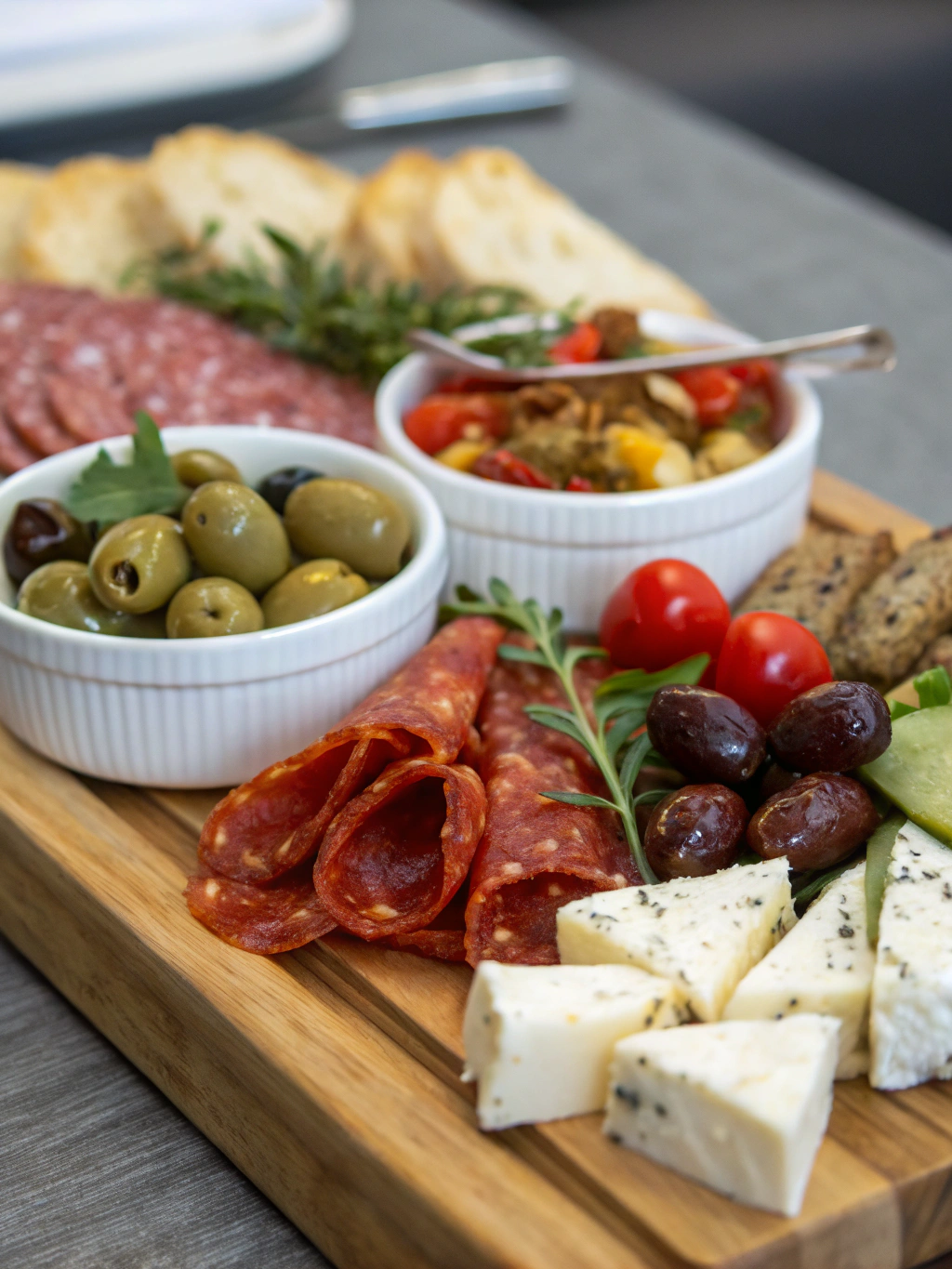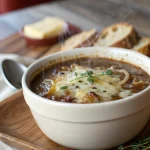Introduction
Did you know that the average host spends over 5 hours preparing for a party, with appetizers taking up nearly 40% of that time? What if you could create stunning, crowd-pleasing finger foods in just minutes instead? Antipasto or Mezze Platters are the perfect solution for easy cold appetizers and party finger foods that will elevate your summer entertaining without keeping you trapped in the kitchen. These versatile platters combine the Mediterranean tradition of small bites with artistic presentation, creating not just a dish but a centerpiece that invites conversation and connection around your table.
Ingredients List for Antipasto or Mezze Platters
For an Italian-Inspired Antipasto:
- 3-4 varieties of cured meats (prosciutto, salami, coppa, mortadella)
- 2-3 types of cheese (aged provolone, fresh mozzarella, parmigiano reggiano)
- Marinated artichoke hearts
- Mixed olives (Kalamata, Castelvetrano, Cerignola)
- Roasted red peppers
- Grilled or marinated vegetables (zucchini, eggplant)
- Fresh figs or grapes
- Breadsticks or crostini
- Extra virgin olive oil for drizzling
For a Mediterranean Mezze Platter:
- Hummus (classic or roasted red pepper)
- Tzatziki or labneh
- Stuffed grape leaves (dolmas)
- Falafel balls (store-bought or homemade)
- Feta cheese
- Mixed olives
- Fresh vegetables for dipping (cucumber, bell peppers, carrots)
- Pita bread or lavash
- Muhammara (roasted red pepper and walnut dip)
Substitution Ideas: For vegetarian options, replace meats with extra marinated vegetables or plant-based proteins. Dairy-free guests will appreciate cashew-based cheese alternatives or additional dips like baba ganoush.
Timing for Antipasto or Mezze Platters
- Preparation Time: 20-25 minutes (30% less time than traditional appetizer spreads)
- Assembly Time: 10-15 minutes
- Total Time: 30-40 minutes
- Make-Ahead Potential: Components can be prepared up to 24 hours in advance
Step-by-Step Instructions for Antipasto or Mezze Platters
Step 1: Select and Prepare Your Board
Choose a large wooden board, slate platter, or even a rimmed baking sheet. The ideal base should have enough surface area for all components while allowing guests to easily access everything. For a party of 6-8 people, aim for a board that’s at least 16-18 inches in diameter or length.
Pro Tip: Line your board with parchment paper first if using messy items like honey or olive oil for easy cleanup.
Step 2: Position Your Anchor Items
Start by placing your larger items or containers first – ramekins of dips, small bowls of olives, and substantial cheese wedges. Position these anchors at different points around your board, creating zones that you’ll fill in later. This strategic placement ensures balanced visual appeal and easy access for guests.
Pro Tip: Odd numbers (3 or 5 anchor items) are more visually appealing than even numbers according to design principles.
Step 3: Add Meats and Cheeses
For cured meats, create height and dimension by folding or rolling slices. Prosciutto can be loosely rolled into roses, while salami can be folded into quarters. For cheeses, offer variety in textures and flavors – something soft (mozzarella), something aged (parmesan), and something spreadable (goat cheese).
Pro Tip: Cut some cheese in advance but leave some whole pieces with a knife nearby, as pre-cut cheese dries out faster.
Step 4: Fill in with Fruits and Vegetables
Add colorful elements by tucking in fresh and marinated vegetables around your anchor items. For antipasto, think marinated artichokes and roasted peppers; for mezze, add cucumber slices and cherry tomatoes. Fresh fruit like grapes or figs adds a sweet contrast to savory components.
Pro Tip: Blanch vegetables like asparagus or green beans for 60 seconds then shock in ice water for vibrant color that maintains crispness.
Step 5: Complete with Breads and Garnishes
Add breadsticks, crostini, or pita bread in strategic spots around the board. Finally, fill any remaining gaps with nuts, fresh herbs (basil or mint sprigs), and small garnishes like honey drizzles or flaky salt. These finishing touches elevate the presentation from good to spectacular.
Pro Tip: Provide small serving utensils for each component to prevent flavor mixing and accommodate guests with dietary preferences.
Nutritional Information for Antipasto or Mezze Platters
While specific values vary based on your selected components and portion sizes, a typical 1/4 board serving contains approximately:
- Calories: 350-450 kcal
- Protein: 15-20g
- Carbohydrates: 20-30g
- Fats: 20-25g (primarily healthy monounsaturated fats from olive oil and nuts)
- Sodium: 800-1000mg (primarily from cured meats and cheeses)
Note: Mezze platters typically offer lower calorie and sodium profiles compared to traditional antipasto, with approximately 15% fewer calories and 25% less sodium when plant-based components dominate.
Healthier Alternatives for Antipasto or Mezze Platters
- Replace 50% of cured meats with roasted chickpeas or white beans tossed in herbs
- Use Greek yogurt-based dips instead of high-fat alternatives
- Incorporate more raw vegetables for increased fiber and nutrients
- Choose whole grain crackers and breads over refined options
- Offer fruit-based components (like balsamic-marinated strawberries) to reduce overall sodium
- Include unsalted nuts for healthy fats without added sodium
Serving Suggestions for Antipasto or Mezze Platters
These versatile platters are perfect cold snacks for any occasion, but truly shine as:
- Pre-dinner appetizers while the main course finishes cooking
- The centerpiece of a casual cocktail party
- Easy cold hors d’oeuvres for outdoor summer gatherings
- A light lunch option paired with chilled white wine or sparkling water
- An interactive conversation starter for dinner parties
For temperature-sensitive items like cheese, consider replacing them halfway through longer events to maintain optimal texture and flavor.
Common Mistakes to Avoid for Antipasto or Mezze Platters
- Overcrowding the board (leave about 10-15% empty space for visual appeal)
- Placing wet ingredients next to crackers or bread (they’ll become soggy)
- Using only one height level (create dimension with folded meats, stacked crackers)
- Forgetting serving utensils (provide small forks, spoons, or toothpicks)
- Preparing too far in advance (most components are best assembled within 2 hours of serving)
- Neglecting dietary restrictions (always include plant-based options)
Storing Tips for Antipasto or Mezze Platters
- Assemble perishable components no more than 2 hours before serving
- Keep prepared components separately refrigerated in airtight containers up to 24 hours before assembly
- Store leftover components separately rather than leaving the entire platter intact
- Consume leftover cured meats within 3-4 days, dips within 5 days
- Refresh stale bread by wrapping in foil and warming at 300°F for 5-10 minutes
Conclusion
Antipasto or Mezze Platters transform summer entertaining from stressful to spectacular by combining easy cold appetizers with impressive presentation. These versatile finger foods allow you to showcase seasonal produce, accommodate various dietary needs, and spend more time enjoying your party rather than cooking. Whether you prefer the robust flavors of Italian antipasto or the vibrant spices of Mediterranean mezze, these customizable platters deliver both convenience and culinary delight. Try creating your own spectacular platter this weekend and watch as your guests gather around this edible centerpiece!
FAQs for Antipasto or Mezze Platters
How far in advance can I prepare an antipasto or mezze platter?
You can prepare individual components up to 24 hours in advance, but assemble the final platter no more than 2 hours before serving for optimal freshness and appearance.
What’s the difference between antipasto and mezze?
Antipasto is Italian-derived with emphasis on cured meats, cheeses, and marinated vegetables, while mezze originates from the Eastern Mediterranean and Middle East, featuring more plant-based dips, spreads, and small bites.
How much should I prepare per person?
For appetizers before a meal, plan for 3-4 ounces per person. For a main course, allow 6-8 ounces per person, with a higher ratio of substantial components like cheese and meats.
What can I serve with these platters for a complete meal?
A light soup, simple grilled protein, or fresh summer salad pairs perfectly with these platters to create a complete meal without overwhelming guests.
Are these platters budget-friendly?
They can be! Focus on seasonal produce, supplement with less expensive components like homemade hummus, and select just one or two premium items (like specialty cheese) as highlights rather than filling the board with costly ingredients.
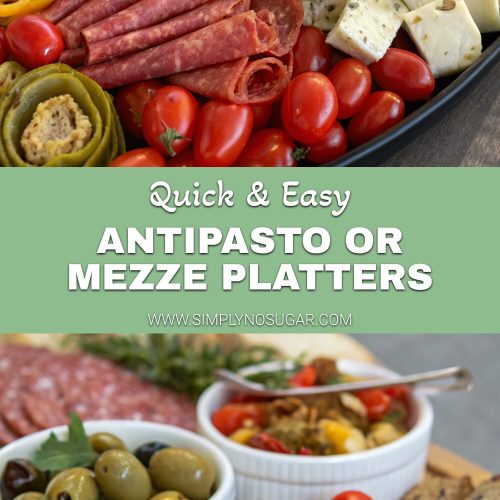
Antipasto or Mezze Platters
Equipment
- Large Wooden Board or Slate Platter
- Small Serving Bowls
- Serving Utensils
Ingredients
Italian-Inspired Antipasto
- 3-4 varieties cured meats prosciutto, salami, coppa, mortadella
- 2-3 types cheese aged provolone, fresh mozzarella, parmigiano reggiano
- marinated artichoke hearts
- mixed olives Kalamata, Castelvetrano, Cerignola
- roasted red peppers
- grilled or marinated vegetables zucchini, eggplant
- fresh figs or grapes
- breadsticks or crostini
- extra virgin olive oil for drizzling
Mediterranean Mezze Platter
- hummus classic or roasted red pepper
- tzatziki or labneh
- stuffed grape leaves dolmas
- falafel balls store-bought or homemade
- feta cheese
- mixed olives
- fresh vegetables for dipping cucumber, bell peppers, carrots
- pita bread or lavash
- muhammara roasted red pepper and walnut dip
Instructions
- Select a large wooden board, slate platter, or rimmed baking sheet. For a party of 6-8 people, aim for a board that's at least 16-18 inches in diameter or length. Line with parchment paper if using messy items like honey or olive oil for easy cleanup.
- Position your larger items or containers first – ramekins of dips, small bowls of olives, and substantial cheese wedges. Place these anchors at different points around your board, creating zones that you'll fill in later. Odd numbers (3 or 5 anchor items) are more visually appealing.
- Add meats and cheeses. For cured meats, create height and dimension by folding or rolling slices. Prosciutto can be loosely rolled into roses, while salami can be folded into quarters. For cheeses, offer variety in textures and flavors – something soft (mozzarella), something aged (parmesan), and something spreadable (goat cheese).
- Fill in with colorful fruits and vegetables by tucking in fresh and marinated vegetables around your anchor items. For antipasto, add marinated artichokes and roasted peppers; for mezze, add cucumber slices and cherry tomatoes. Fresh fruit like grapes or figs adds a sweet contrast to savory components.
- Complete with breadsticks, crostini, or pita bread in strategic spots around the board. Fill any remaining gaps with nuts, fresh herbs (basil or mint sprigs), and small garnishes like honey drizzles or flaky salt. Provide small serving utensils for each component.


